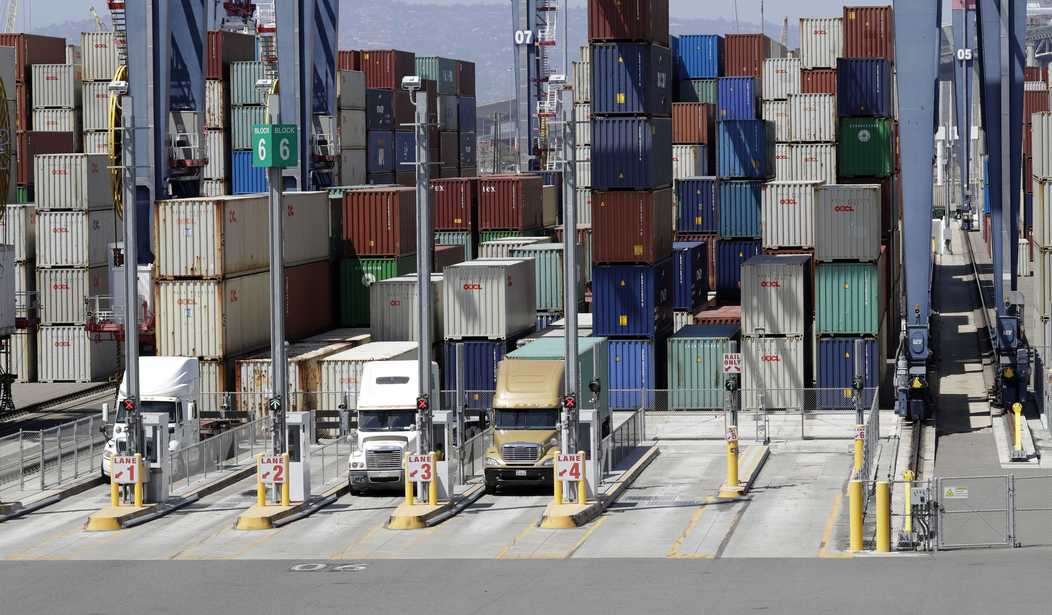Paranoia or precautionary? The Biden administration is worried that cranes manufactured by China and the software that runs them may be a national security risk.
The White House announced a huge initiative to spend $20 billion over the next five years to invest in port security including $5 billion to build American-made port cranes to replace most of the cranes in the U.S that were built in China.
The new cranes are part of a much larger package of maritime security reforms, including "a U.S. Coast Guard directive to mandate certain digital security requirements for deployed foreign-built cranes at strategic seaports, as well as an executive order by President Biden setting baseline cybersecurity standards for computer networks that operate U.S. ports," according to the Wall Street Journal.
The money is from the $1 trillion infrastructure bill. A U.S. subsidiary of Mitsui, a Japanese company, will build the cranes.
“We felt there was real strategic risk here,” said Anne Neuberger, U.S. deputy national security adviser for cyber and emerging technology. “These cranes, because they are essentially moving the large-scale containers in and out of port, if they were encrypted in a criminal attack, or rented or operated by an adversary, that could have real impact on our economy’s movement of goods and our military’s movement of goods through ports.”
The Biden administration’s actions follow a Wall Street Journal investigation last year that revealed U.S. fears that giant cranes made by a Chinese, state-owned company in use at a number of U.S. ports could present an espionage and disruption risk. Cranes at some ports used by the U.S. military were flagged as surveillance threats. Officials also raised the concern that the software on the cranes could be manipulated by the Chinese to impede American shipping or worse, temporarily disrupt the operation of the crane.
“By design these cranes may be controlled, serviced and programmed from remote locations,” said Rear Adm. John Vann, who leads the Coast Guard cyber command, during a press briefing. “These features potentially leave PRC-manufactured cranes vulnerable to exploitation,” he said, referring to the People’s Republic of China.
Many members of Congress support the administration's cybersecurity efforts at our ports. Rep. Carlos Giménez (R-Fla.) chairs the Homeland Security Subcommittee on Transportation and Maritime Security and says his committee will hold hearings in the next few weeks on port cyber security.
“Communist China is no friend to the United States and consistently works to undermine American interests and our security,” said Giménez. “Our ports are critical hubs of economic activity, a cyberattack by Communist China could cause a cascading impact to domestic and global supply chains."
The U.S. military has known about the threat from Chinese cranes for years, going so far as to avoid ports where the cranes, manufactured by the Chinese company ZPMC, are in operation. They account for nearly 80% of ship-to-shore cranes in use at U.S. ports.
Craig Singleton, a senior fellow at the Foundation for Defense of Democracies, a Washington think tank, testified before Congress last week about Chinese infiltration of our security networks.
“Increasingly, the Chinese are not merely seeking access to our networks; they are pre-emptively positioning to compromise and control them,” Singleton said in his testimony. “As a result, China is poised to impede the mobilization of American military forces, foment a state of disarray, and redirect national attention and resources in both war and short-of-war scenarios.”
It sounds like we're a step behind the Chinese, although when it comes to cyber warfare, we can't say for sure. These are some of the most closely guarded secrets in the U.S. But the fact we're spending $20 billion over the next five years suggests that we've got some catching up to do.










